On 24th August 2024, FV Hospital organised a CME training programme titled “Multidisciplinary Approach in The Treatment of Gastrointestinal and Hepatobiliary Diseases.” The programme brought together experts in the field from Vietnam and Singapore, whose presentations covered advanced techniques in diagnosing and treating gastrointestinal and liver diseases.
FV Hospital applies modern techniques and emphasises international collaboration for the treatment of gastrointestinal and hepatobiliary conditions.
In the opening speech, Vu Truong Son, MD, MSc, Acting Medical Director of FV Hospital, highlighted the upcoming collaboration between FV and specialists from Singapore. He emphasised that this partnership would bring valuable experiences to the medical community and offer advanced treatment options for patients in Vietnam. “Instead of traveling abroad for treatment, patients will have access to cutting-edge techniques here in Ho Chi Minh City, with Singaporean experts who regularly at FV”.
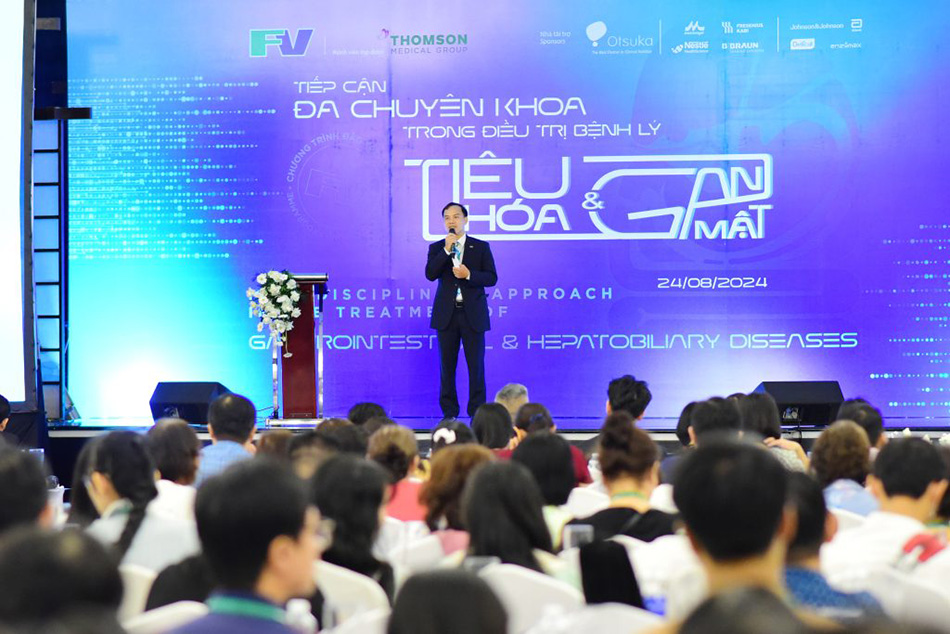
Vu Truong Son, MD, MSc, Acting Medical Director of FV Hospital, delivered the opening speech
At the beginning of the programme, Specialist Level II, Bui Nhuan Quy, MD, MSc, Head of Gastroenterology & Hepatology Department at FV Hospital, introduced the application of modern techniques in the treatment of gastrointestinal and hepatobiliary diseases at FV. He mentioned that the department handles over 14,000 patients annually. The department also employs most of the advanced techniques available today, such as capsule endoscopy, endoscopic ultrasound (EUS), high-resolution impedance manometry (HRM), endoscopic retrograde cholangiopancreatography (ERCP) and Spyglass, elastography (FibroScan), among others. These technologies have significantly improved the ability to diagnose and treat diseases related to the digestive system, as well as in cancer screening and prevention.
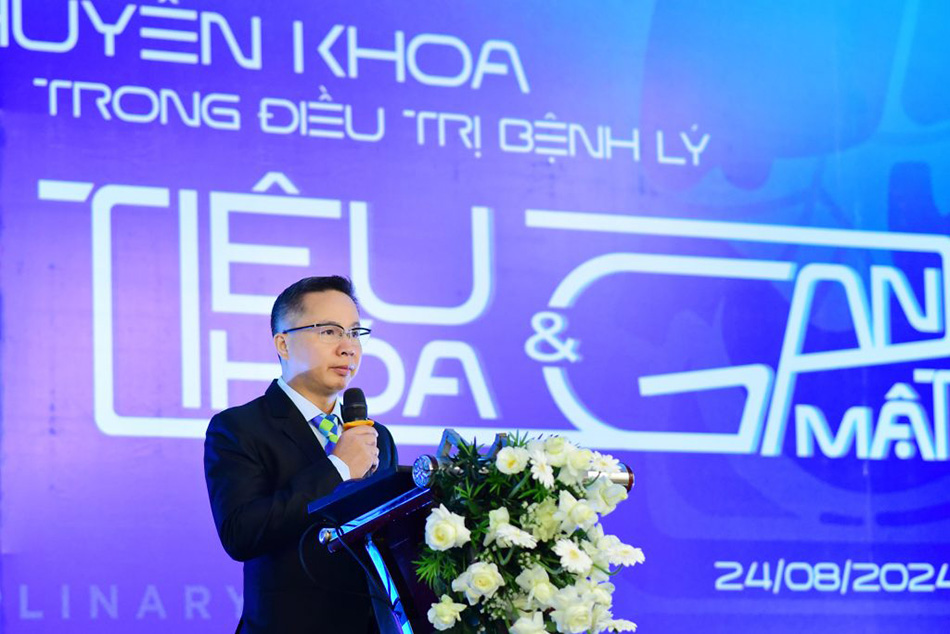
Specialist Level II, Bui Nhuan Quy, MD, MSc, Head of Gastroenterology & Hepatology Department at FV Hospital, introduced the application of modern techniques in the treatment of gastrointestinal and hepatobiliary diseases at FV
In particular, Dr Quy emphasised the importance of Endoscopic Ultrasound (EUS) for assessment of early gastrointestinal cancer. He also highlighted the use of advanced techniques such as Endoscopic Submucosal Dissection (ESD) and Endoscopic Mucosal Resection (EMR) for early and pre-cancerous treatment. Additionally, FV Hospital is soon to implement a 24-hour pH impedance measurement device, which promises to enhance the diagnosis and treatment of gastroesophageal reflux disease (GERD).
Colorectal Cancer Screening at Age 45
Dr Jarrod Lee – Founder & CEO, GutCARE Singapore (the first and largest digestive practice group in Singapore), emphasised the importance of colorectal cancer screening at age 45 instead of 50. He cited research showing that early screening improves patient survival rates (if cancer is detected) and reduces the incidence of colorectal cancer through early treatment. Although the number of colonoscopies may increase, the complication rate for the 45-year-old age group is relatively low, and recovery tends to be quicker. As a result, many medical associations, including the American Cancer Society, recommend starting colorectal cancer screening at age 45.

Dr Jarrod Lee – Founder & CEO, GutCARE, emphasized the importance of colorectal cancer screening at age 45 instead of 50
During the presentation, Dr Lee also highlighted the role of artificial intelligence (AI) in polyp screening, which helps reduce the likelihood of missing adenomas during colonoscopy by 35%-52% and enhances image magnification, improving the detection of small rectal polyps to over 90%. However Dr Lee remarked, “I still emphasise that improving the skill of the endoscopist for detecting and thoroughly removing polyps remains the most crucial factor for providing optimal benefits to patients.”
Recent updates in surgical treatment for gastrointestinal cancer
Specialist Level II, Phan Van Thai, MD, MSc, Head of General Surgery at FV Hospital, provided updates on the latest advancements in surgical treatment for colorectal cancer. He introduced the D3 lymph node dissection technique, a more complex but highly effective method for treating colorectal cancer at FV Hospital. Dr Thai also discussed sphincter-sparing techniques in the treatment of low rectal cancer, as well as options for colon resection, stent placement, or creating a permanent colostomy based on the patient’s condition and preferences. Additionally, Dr Thai cited several specific cases, including the treatment of low rectal cancer with pelvic herniation, following the protocol of the Japanese Society for Colorectal Cancer and Rectal Cancer (JSCCR).
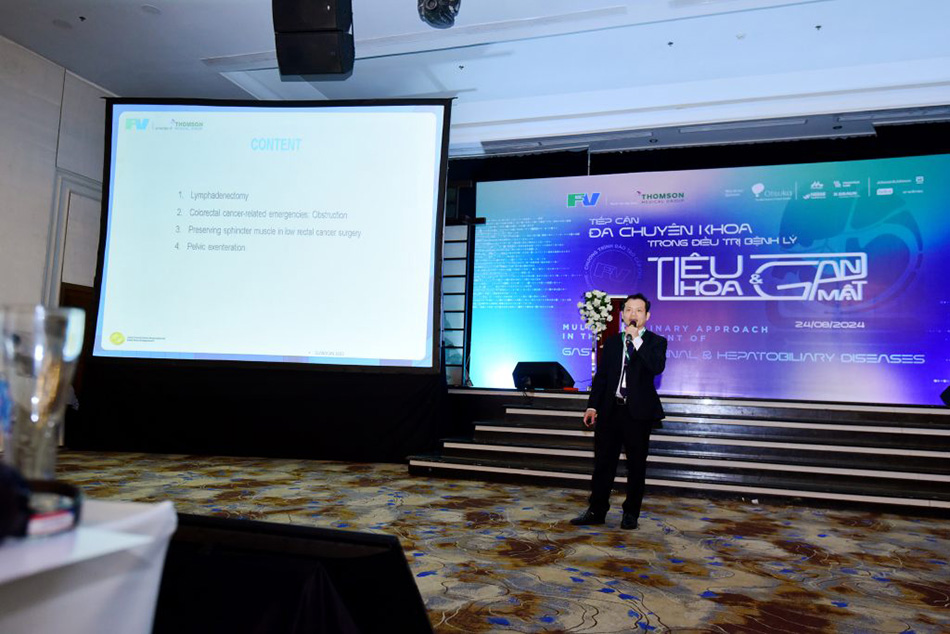
Specialist Level II, Phan Van Thai, MD, MSc, Head of General Surgery at FV Hospital, updated the latest advancements in surgical treatment for colorectal cancer.
In the topic of gastrointestinal surgery, Ho Dang Quy Dung MD, PhD – Head of Endoscopy Department, Cho Ray Hospital & President, Vietnamese Federation for Digestive Endoscopy, elaborated on the technique of Endoscopic Ultrasound (EUS) and its future prospects. EUS is considered an effective diagnostic tool for detecting gastrointestinal lesions, performing biopsies for early cancer diagnosis, and now plays and increasingly significant role in diagnosing and intervening in biliary and pancreatic diseases. In addition to introducing and detailing the techniques, Dr Dung emphasised the importance of patient screening and guiding patients to facilities equipped with EUS for necessary diagnosis and treatment.
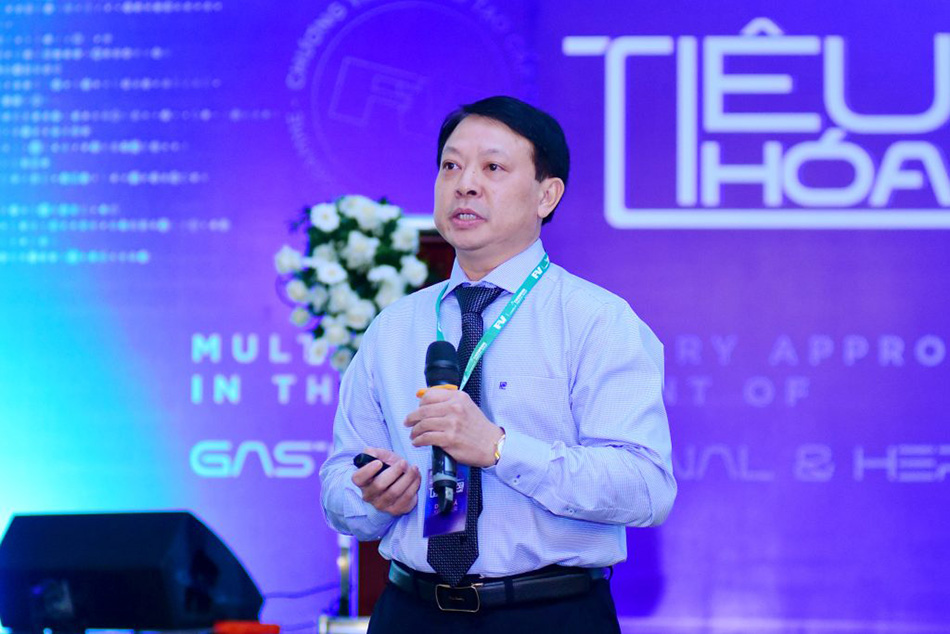
Ho Dang Quy Dung MD, PhD – Head of Endoscopy department, Cho Ray Hospital & President, Vietnamese Federation for Digestive Endoscopy presents at the training programme
Nutritional approaches in preventing digestive tract cancer
Specialist Level II, Nguyen Viet Quynh Thu, MD, MSc, Head of Dietetics & Nutrition Department at FV Hospital, presentation was on the role of nutrition in preventing digestive tract cancers. Dr Thu emphasised: “Cancer is a preventable disease. 40% of cancer cases can be prevented through diet, physical activity, and weight management.” She explained that reducing risk factors such as smoking, alcohol consumption, excessive salt and red meat intake, and managing overweight and obesity can help mitigate cancer-causing agents.
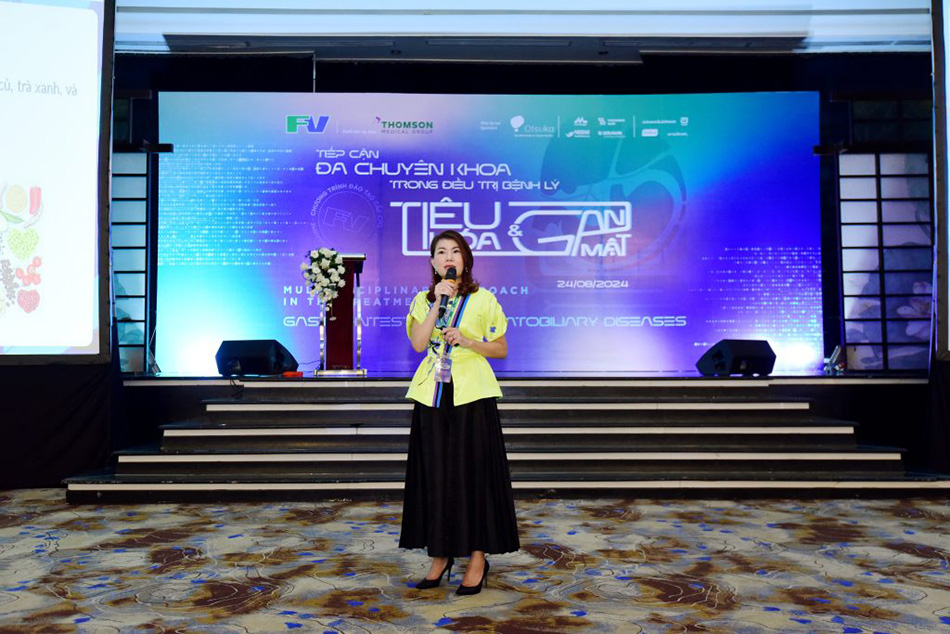
Specialist Level II, Nguyen Viet Quynh Thu, MD, MSc, Head of Dietetics & Nutrition Department at FV Hospital, presented on the role of nutrition in preventing digestive tract cancers
Dr Thu highlighted that various food-related factors that contribute to cancer risk, such as aflatoxins produced by mould on nuts, nitrosamines in fermented foods using salt, and various food additives. She also recommended consuming antioxidant-rich foods such as vitamins A, C, and E, and fibre found in fruits and vegetables; calcium-rich foods; following a Mediterranean diet; and enhancing gut microbiota through a diet rich in probiotics and prebiotics to help prevent various digestive tract cancers.
Aiming for a specialised digestive health centre
The discussion became more dynamic with numerous questions directed at Dr Jarrod Lee, focusing on the latest medical advancements and the upcoming collaboration plans of the Singaporean expert in Vietnam. Additionally, attendees expressed a keen interest in learning more about the advanced techniques being applied in the treatment of digestive and hepatobiliary disorders at FV, which is delivering new strides in community healthcare.

The speakers answer questions from the attendees at the training programme.
Earlier, Specialist Level II, Bui Nhuan Quy, MD, MSc, also shared plans to develop the Gastroenterology & Hepatology Department into a specialised centre with expanded infrastructure and modern equipment, such as: AI-assisted endoscopy systems, small bowel endoscopy, EUS, and POEM (Peroral Endoscopic Myotomy). FV Hospital is collaborating with leading experts from Singapore, France, Japan, and India to enhance professional skills and aim to become an international training environment.
This CME training programme has provided valuable and up-to-date gastroenterology information, particularly for the treatment of digestive and hepatobiliary disorders. The collaboration between FV and healthcare institutions in Singapore will continue to bring practical knowledge and experience, as well as the latest advancements in medical techniques, contributing to improving the quality of healthcare for patients in Vietnam.



